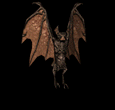Tuesday, August 24, 2004
After looking at these two, they look more and more alike.
GEN. MERRILL MCPEAK: “As a fighter pilot, I saw my share of combat. As chief of staff, I led the Air Force during the first Gulf War. And four years ago, I endorsed George Bush for President. But this year, I¹m voting for John Kerry. Nothing is more important to me than protecting America. John Kerry has the strength and common sense we need in a commander in chief. And something more – a real strategy to make America safer.”
Bush's CIA Nominee Tried to Gut Key Intelligence ProgramsPresident Bush has repeatedly criticized his opponent1 for joining with Republicans to slightly reduce funding for intelligence after the end of the Cold War.2 But a new report shows that the President recently nominated a CIA Director who tried to make far deeper cuts in intelligence, even as terrorist attacks against the United States increased. Despite the known threat of terrorism, Bush nominated Rep. Porter Goss (R-FL) to be the new CIA Director - a man who has led the effort to cut the very intelligence priorities that are most critical to the fight against terrorism. As the Washington Post reports, Goss actually "sponsored legislation that would have cut intelligence personnel by 20 percent in the late 1990s." Goss insisted on these cuts even after the 1993 World Trade Center attack when America became aware of the serious terrorist threat. As the story notes, the cuts Goss supported are far larger than those proposed by Sen. John Kerry (D-MA) and were specifically targeted at "human intelligence." That is the very same priority which the 9/11 Commission and other independent experts say was lacking in the days and months leading up to the 9/11 attacks.3 The revelations about Goss come only a few weeks after similar evidence came to light showing that Vice President Cheney has also repeatedly tried to stop intelligence reforms and cut critical defense programs. For instance, in 1992, Cheney led the effort to block the very same intelligence reforms the 9/11 Commission said would have made the United States better prepared to deal with the threat of al Qaeda. Similarly, while the Bush-Cheney campaign has attacked Kerry for supposedly reducing defense spending,4 it was Cheney himself in 2000 who admitted that as Defense Secretary, he "did in fact significantly reduce the overall size of the U.S. military."5 And in 1990, it was Cheney who went to Capitol Hill to tout his effort to slash defense, bragging about "programs that I have recommended for termination."6 Sources:
"Bush chides Kerry on intelligence cuts," Washington Times, 3/09/04.
"Bush Strains Facts Re: Kerry's Plan To Cut Intelligence Funding in '90's," FactCheck.org, 3/15/04.
"Goss Backed '95 Bill to Slash Intelligence," Washington Post, 8/24/04.
"Remarks by the Vice President at the Ronald Reagan Presidential Library and Museum," WhiteHouse.gov, 3/17/04.
"latimes.com: Cheney acknowledges defense cuts began on his watch," CNN.com, 8/24/00.
Congressional Testimony, 2/01/90.
GEN. MERRILL MCPEAK: “As a fighter pilot, I saw my share of combat. As chief of staff, I led the Air Force during the first Gulf War. And four years ago, I endorsed George Bush for President. But this year, I¹m voting for John Kerry. Nothing is more important to me than protecting America. John Kerry has the strength and common sense we need in a commander in chief. And something more – a real strategy to make America safer.”
Bush's CIA Nominee Tried to Gut Key Intelligence ProgramsPresident Bush has repeatedly criticized his opponent1 for joining with Republicans to slightly reduce funding for intelligence after the end of the Cold War.2 But a new report shows that the President recently nominated a CIA Director who tried to make far deeper cuts in intelligence, even as terrorist attacks against the United States increased. Despite the known threat of terrorism, Bush nominated Rep. Porter Goss (R-FL) to be the new CIA Director - a man who has led the effort to cut the very intelligence priorities that are most critical to the fight against terrorism. As the Washington Post reports, Goss actually "sponsored legislation that would have cut intelligence personnel by 20 percent in the late 1990s." Goss insisted on these cuts even after the 1993 World Trade Center attack when America became aware of the serious terrorist threat. As the story notes, the cuts Goss supported are far larger than those proposed by Sen. John Kerry (D-MA) and were specifically targeted at "human intelligence." That is the very same priority which the 9/11 Commission and other independent experts say was lacking in the days and months leading up to the 9/11 attacks.3 The revelations about Goss come only a few weeks after similar evidence came to light showing that Vice President Cheney has also repeatedly tried to stop intelligence reforms and cut critical defense programs. For instance, in 1992, Cheney led the effort to block the very same intelligence reforms the 9/11 Commission said would have made the United States better prepared to deal with the threat of al Qaeda. Similarly, while the Bush-Cheney campaign has attacked Kerry for supposedly reducing defense spending,4 it was Cheney himself in 2000 who admitted that as Defense Secretary, he "did in fact significantly reduce the overall size of the U.S. military."5 And in 1990, it was Cheney who went to Capitol Hill to tout his effort to slash defense, bragging about "programs that I have recommended for termination."6 Sources:
"Bush chides Kerry on intelligence cuts," Washington Times, 3/09/04.
"Bush Strains Facts Re: Kerry's Plan To Cut Intelligence Funding in '90's," FactCheck.org, 3/15/04.
"Goss Backed '95 Bill to Slash Intelligence," Washington Post, 8/24/04.
"Remarks by the Vice President at the Ronald Reagan Presidential Library and Museum," WhiteHouse.gov, 3/17/04.
"latimes.com: Cheney acknowledges defense cuts began on his watch," CNN.com, 8/24/00.
Congressional Testimony, 2/01/90.
Subscribe to Comments [Atom]




















































































